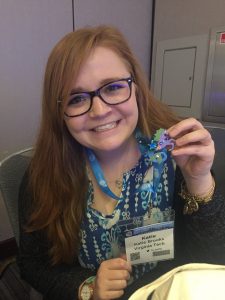How would your studies and / or your professional experiences advance the goals of WPA-GO? These goals may be found in the About Me section of WPA-GO’s website: http://wpacouncil.org/wpa-go (no more than 150 words) *
As the assistant to the director of composition at Virginia Tech, I mentor around twenty new GTA instructors and am the advisor for a group of seven MA and MFA students. In this capacity, I uphold the goals of WPA-GO in that I support new graduate student teachers through their time in the program, connect them to scholarship and pedagogy from the field of composition, and encourage them to foster equitable communities in their own classrooms. Part of my work in this administrative role has been to create a graduate student handbook for GTAs in Virginia Tech’s first-year writing program. In this handbook, I have compiled information about VT’s program, VT’s students, and VT’s institutional policies. Within this document, I have also included resources for anti-racist writing assessment, resources on cultural rhetorics, and resources on inclusivity in the writing classroom.
What kinds of support do you value as a graduate student and how would you further those forms of support for others through WPA-GO? (no more than 250 words) *
The kind of support that I value the most comes from my peers in my program, on Twitter, and on NextGen. I have received a lot of support from the faculty at Virginia Tech and at other institutions, but talking about my projects or teaching with folks going through the same thing means so much to my growth as a person, teacher, and person. As a member of WPA-GO, I would like to foster connections for graduate students from across programs to meet and collaborate. I was part of the CCCC 2019 planning committee for the meet-up, and while that was a great event—there was a lot of networking—I would like to see more spaces for WPA-GO at the larger conferences in the field. Planning and facilitating panels, meet-ups, hang-outs, or even spaces for graduate students to inhabit at the larger conferences—like at CWPA—could foster more connections between graduate students. These spaces could also make attending a large conference easier to manage. Particularly, at a large conference, like CCCC, we can plan a WPA-GO Room one or two days of the conference that would allow us to network with other graduate students and each other in a calm, inviting space. Another opportunity for growth that I believe I can help with is implementing these collaborative opportunities is to work with WPA-GO on making ourselves visible at other conferences, like Rhetoric Society of America (RSA).
CWPA pledges to “foster inclusion more generally; promote research into student diversities; promote policies that increase diversity in our membership and in the population of people who administer writing programs; and explicitly act against the structures that cause injustice today,” and WPA-GO is dedicated to supporting this mission. How will your selection to the WPA-GO Graduate Committee advance these goals? Please answer this question by choosing one barrier you identify to meeting these goals in writing studies. How would your work within WPA-GO specifically address this barrier? (no more than 500 words) *
After Asao Inoue’s CCCC Plenary Address in Pittsburgh, I reflected on the ways in which I, a white woman, may unknowingly reinforce language supremacy in my classrooms. When I first started teaching, my teaching pedagogy and methods of writing assessment were heavily influenced by the CCC Statement “Students’ Right to Their Own Language.” I come from a small town in Central Appalachian Virginia, and I have felt judgment and critique from peers, instructors, and students from the non-standard dialect of English that exists in my home place. At my undergraduate institution, I was consistently penalized for the way I pronounce words and use English. So, I knew when I entered the classroom that I did not want to uphold any policies or assessments that would penalize students for their home voices. Inoue’s address reminded me that, despite my disposition for embracing all Englishes in my classroom, there is still work to do within our institutions, programs, and classrooms. My selection to the WPA-GO Graduate Committee will allow me to further my own knowledge of language diversity and to help me gain the tools for dismantling racist writing assessment at my own university to the best of my ability. If selected to the WPA-GO Graduate Committee, I bring knowledge of regional variations of Englishes, and how students from those backgrounds inhabit our universities with a fear of how using their regional dialects could affect their chances at being successful. My understanding and personal experiences with Appalachian English variants can help me further the mission of “fostering inclusion” and “promot[ing] research into student diversities.” While not a racialized variant of English, Appalachian English, and the study of Appalachian Rhetorics at large, helps us to see the ways in which issues with language diversity are much more interconnected. If selected to the WPA-GO Graduate Committee, I will work with the committee to promote policies that will increase the diversity within our organization and support the work already being done against racist writing assessment. My work with WPA-GO will help grow my own knowledge that I can in turn take back and implement at my institution.
